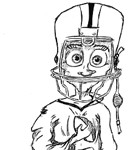All Nonfiction
- Bullying
- Books
- Academic
- Author Interviews
- Celebrity interviews
- College Articles
- College Essays
- Educator of the Year
- Heroes
- Interviews
- Memoir
- Personal Experience
- Sports
- Travel & Culture
All Opinions
- Bullying
- Current Events / Politics
- Discrimination
- Drugs / Alcohol / Smoking
- Entertainment / Celebrities
- Environment
- Love / Relationships
- Movies / Music / TV
- Pop Culture / Trends
- School / College
- Social Issues / Civics
- Spirituality / Religion
- Sports / Hobbies
All Hot Topics
- Bullying
- Community Service
- Environment
- Health
- Letters to the Editor
- Pride & Prejudice
- What Matters
- Back
Summer Guide
- Program Links
- Program Reviews
- Back
College Guide
- College Links
- College Reviews
- College Essays
- College Articles
- Back
Author-Jerry B. Jenkins
Most well known for his post-apocalyptic series, Left Behind, Jerry B. Jenkins has written over 150 books covering a wide variety of genres including romance, mysteries and young adult, as well as working as a magazine editor and the vice-president of publishing for Moody Bible Institute. Sixteen of his novels have made their way onto the New York Times bestsellers list.
Mr. Jenkins graciously agreed to allow me to interview him recently for Teen Ink.
RH: Firstly, I would like to thank you for taking the time for this interview.
JBJ: You’re welcome.
RH: When did you first become interested in writing?
JBJ: In high school I became a sportswriter for a local paper, even before I was old enough to drive.
RH: When did you know you wanted to make your career as an author?
JBJ: In the late 80s I had written 80 or so books and decided to go full time freelance.
RH: For a girl who has not co-written a book since the first grade, explain how the process works.
JBJ: There is no process. You put your seat in the chair and start writing till you’re done.
RH: Does it make it harder or easier to write a novel?
JBJ: Does what make it easier? Regardless, nothing makes it easier. It’s very grueling and hard.
RH: How was it different writing the Left Behind: the Kids series opposed to the adult Left Behind?
JBJ: You just be careful you’re limiting your vocabulary to your intended audience. Otherwise, it’s the same.
RH: How long did you and Dr. Lahaye spend in research before actually writing the Left Behind series?
JBJ: He spent a life time. I depended heavily on his research as I did all the writing.
RH: What part did you have in bringing your novels to life on the big screen?
JBJ: None, and we were not happy with the result.
RH: Is there any talk of when, or if, Nicholae will be adapted?
JBJ: I have no idea whether Nicolae will be filmed. I hope not, unless it’s better.
RH: When you're not writing, how do you spend your time?
JBJ: Family is important to me. I spend a lot of time with my wife, three grown sons, and five grandchildren. And I am a voracious reader and moviegoer.
RH: Are you working on any new projects that you would like to tell the readers at Teen Ink about?
JBJ: I’m currently writing a trilogy of cop thriller novels set in Chicago. The first released in February.
RH: Where do you find inspiration for your books?
JBJ: I think inspiration is overrated. I want to write and it’s all I do.
RH: Have you had a favorite book that you have written? Whether due to the writing process or the plot-line?
JBJ: Riven is my all-time favorite because the idea was with me for more than twenty years, and when I finally got to it I was happy with the result.
RH: How do you create characters?
JBJ: I use one person’s face, another’s gender, another’s voice, another’s height, etc. All characters are composites of real people.
RH: How does your faith and belief-system impact your writing?
JBJ: My entire goal as a writer is to share my faith.
RH: Tell the readers a little about your YA books, Dallas O'Neil.
JBJ: They were named after my eldest son, Dallas, and were written when my boys were the ages of the characters. I knew whether the books were working by how interested my own sons were in them.
RH: When you write biographies, are the subjects assigned to you or do you choose?
JBJ: It’s always my choice, even if the suggestion comes from a publisher.
RH: I hear that you write comic strips. Which do you like writing better: Fiction, nonfiction or comics? Why?
JBJ: Fiction is my favorite. The comic strip was also fiction, but I didn’t do the drawing. I wrote the stories and told the artist what to draw. I wroteGil Thorp from 1996-2004.
RH: What/who are your favorite books/authors? Which have inspired you personally?
JBJ: My favorite current writer is Rick Bragg, a former New York Timescolumnist who now writes books, including his best, All Over but the Shoutin’.
RH: Explain how your personal writing process works.
JBJ: When I’m on deadline I write 10-20 pages a day, and the next day the first thing I do is a heavy edit and rewrite of those, and then write the next 10-20 pages. When I’m finished I go through the entire manuscript again and don’t submit it until I’m happy with every word.
RH: Is there anything about your faith that you would like to share with the readers at Teen Ink?
JBJ: My faith is capsulized in John 3:16, John 14:6, and Ephesians 2:8-9.
RH: What advice do you have for the aspiring authors here at Teen Ink?
JBJ: Write every day, read every day. Writers are readers. Good writers are good readers.

Similar Articles
JOIN THE DISCUSSION
This article has 0 comments.